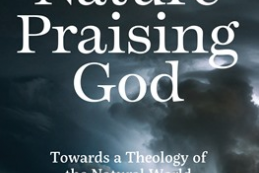Pontifical Council issues Ten Commandments of the Environment
Source: Pontifical Council for Justice and Peace
The Pontifical Council for Justice and Peace has released its Ten Commandments of the Environment, emphasising that "nothing in this world exists outside the divine plan of creation and redemption."
Bishop Giampaolo Crepaldi, secretary of the Pontifical Council for Justice and Peace, presented the points in a message for World Environment Day last week.
Bishop Crepaldi told Vatican Radio the document is an attempt "to explain in 10 points the most important aspects of the chapter on the environment in the Compendium of the Social Doctrine of the Church."
He added that is an effort to enlighten Christian communities, groups and movements on "the very rich social magisterium of the Church on the specific question of the environment and its protection." Bishop Crepaldi expressed his appreciation for the UN's initiative in establishing the world day, although he commented that this year's theme - 'Toward a Low Carbon Economy; - should take other variables into account, involving the relationship between the rich and poor world.
"The objective and perspective delineated by the social magisterium of the Church, confirmed many times by Pope Benedict, is that of a just and unified economy. It is good to decrease the rate of carbon, but it is also necessary to add other things," he said.
Bishop Crepaldi also encouraged the development of alternative energy sources.
"One must be realistic, given that at present it is not possible to sustain the existing economic systems solely with alternative energies," he said.
However, an answer must be also given to "the poverty and underdevelopment of so many areas of the planet, and when we speak of underdevelopment, we are speaking of millions and millions of poor, of people who have nothing," Bishop Crepaldi added.
Regarding the will of the international community to reduce carbon emissions in order to combat global warming, Bishop Crepaldi said that it is a "very complex and controversial" issue, which calls for "greater commitment at the scientific level" to "clarify the terms of this issue, in an effort to evaluate the long term effects."
He noted the need for greater commitment "from the political point of view, because the policies implemented by governments to control so called global warming are policies that are difficult to sustain from the economic point of view; they are too costly. Both scientists as well as politicians, evidently with the participation of civil society, must continue to work in this field."
On nuclear energy the bishop clarified that the Church "condemns its military use," but has "no objection to its civil use."
"Evidently, we are faced with a very delicate issue," said Bishop Crepaldi, "because in this case we have a cultural and political problem when it is stated that nuclear energy will be used for civil needs, but in reality, some are planning to use it for military objectives."
Referring to the environmental commandments, Bishop Crepaldi said that the social teaching of the Church recalls two fundamental points.
"We should not reduce nature to a mere instrument to be manipulated and exploited. Nor should we make nature an absolute value, or put it above the dignity of the human person," he said.
The 10 guiding principles, or commandments, are as follows.
1) The Bible lays out the fundamental moral principles of how to FACE the ecological question. The human person, made in God's image, is superior to all other earthly creatures, which should in turn be used responsibly. Christ's incarnation and his teachings testify to the value of nature: Nothing that exists in this world is outside the divine plan of creation and redemption.
2) The social teaching of the Church recalls two fundamental points. We should not reduce nature to a mere instrument to be manipulated and exploited. Nor should we make nature an absolute value, or put it above the dignity of the human person.
3) The question of the environment entails the whole planet, as it is a collective good. Our responsibility toward ecology extends to future generations.
4) It is necessary to confirm both the primacy of ethics and the rights of man over technology, thus preserving human dignity. The central point of reference for all scientific and technical applications must be respect for the human person, who in turn should treat the other created beings with respect.
5) Nature must not be regarded as a reality that is divine in itself; therefore, it is not removed from human action. It is, rather, a gift offered by our Creator to the human community, confided to human intelligence and moral responsibility. It follows, then, that it is not illicit to modify the ecosystem, so long as this is done within the context of a respect for its order and beauty, and taking into consideration the utility of every creature.
6) Ecological questions highlight the need to achieve a greater harmony both between measures designed to foment economic development and those directed to preserving the ecology, and between national and international policies. Economic development, moreover, needs to take into consideration the integrity and rhythm of nature, because natural resources are limited. And all economic activity that uses natural resources should also include the costs of safeguarding the environment into the calculations of the overall costs of its activity.
7) Concern for the environment means that we should actively work for the integral development of the poorest regions. The goods of this world have been created by God to be wisely used by all. These goods should be shared, in a just and charitable manner. The principle of the universal destiny of goods offers a fundamental orientation to deal with the complex relationship between ecology and poverty.
8) Collaboration, by means of worldwide agreements, backed up by international law, is necessary to protect the environment. Responsibility toward the environment needs to be implemented in an adequate way at the juridical level. These laws and agreements should be guided by the demands of the common good.
9) Lifestyles should be oriented according to the principles of sobriety, temperance and self-discipline, both at the personal and social levels. People need to escape from the consumer mentality and promote methods of production that respect the created order, as well as satisfying the basic needs of all. This change of lifestyle would be helped by a greater awareness of the interdependence between all the inhabitants of the earth.
10) A spiritual response must be given to environmental questions, inspired by the conviction that creation is a gift that God has placed in the hands of mankind, to be used responsibly and with loving care. People's fundamental orientation toward the created world should be one of gratitude and thankfulness. The world, in fact, leads people back to the mystery of God who has created it and continues to sustain it. If God is forgotten, nature is emptied of its deepest meaning and left impoverished.
If, instead, nature is rediscovered in its role as something created, mankind can establish with it a relationship that takes into account its symbolic and mystical dimensions. This would open for mankind a path toward God, creator of the heavens and the earth.


















